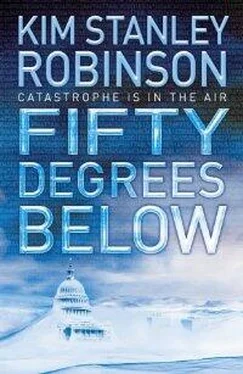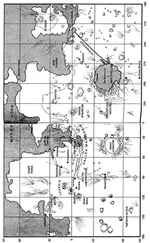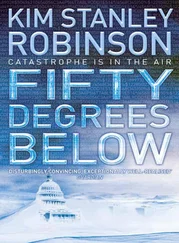For a while he found other more pressing things on his list of Things To Do. But it kept coming back to mind, and he found he wanted to tell her this stuff anyway, to hear her reaction—how she would manage to downplay it. So that afternoon, after running down to Food Factory and giving Edgardo the disk, Frank went over and called Small Delivery Systems from a pay phone down in the Metro, thinking to reduce the number of obvious contacts in the hope it would keep their stock down. He asked for Marta rather than Yann. After a minute she got on, and Frank said Hi.
She greeted him coolly, and he hacked his way through the preliminaries until her lack of cooperation forced him to the point. “I got it arranged like you asked, I mean I couldn’t stay in it directly because of conflict of interest, but it was such a good idea that they did it on their own. There’s to be a new federal science and tech center, focused on climate interventions and housed in Torrey Pine Generique’s old labs. And Yann and your whole team down there is listed for a big Grant for Exploratory Research too. So now you can go back to San Diego.”
“I can go wherever I want,” she said. “I don’t need your permission or your help.”
“No, that isn’t what I meant.”
“Uh huh. Don’t be trying to buy me off, Frank.”
“I’m not. I mean, I owe you that money, but you wouldn’t take it. Anyway this is just a good thing. Yann and you guys get one of the grants, and this will be one of the best research labs anywhere for what you guys are up to.”
“We already have a lab.”
“Small Delivery is too small to deliver.”
“Not so, actually. We’ve just gotten a contract from the Russian government. We’re licensing the genome for our altered tree lichen to them, and we’ll be helping them to manufacture and distribute it in Siberia and Kamchatka this fall.”
“But—wow. Have you had any field trials for this lichen?”
“This is the field trial.”
“What? How big an area?”
“Lichen propagate by wind dispersion.”
“That’s what I thought! Have the Russians talked to us or the UN or anyone?”
“The president believes it’s an internal matter.”
“But the wind blows from Russia to Alaska.”
“No doubt.”
“And so to Canada.”
“Sure. The spruce forest wraps the whole world at that latitude,” Marta agreed. “Our lichen could eventually spread through all of it.”
“And what’s the estimated maximum takedown from that, do you suppose?”
“Eleanor thinks maybe a hundred parts per million.”
“Holy shit!”
“I know, it’s a lot. But we figure there’s no way to cause an ice age now, because we can always put carbon back into the atmosphere if we need to. This drawdown at max would only take us most of the way back to before the Industrial Revolution anyway, so the models we run show it will be a good thing, no matter if the takedown goes to one hundred percent of the estimate or not. Or even if it draws down more.”
“I don’t know how you can say that!”
“That’s what our models show.”
“Any idea how fast the propagation will go?”
“It kind of depends on how we distribute it in the first place.”
“Jesus, Marta. So the Russians are just doing this?”
“Yes. The president thinks it’s too important to risk sharing the decision with the rest of the world. Democracy could hang up their best chance of a rescue, he apparently said. They now think that global warming is more of a disaster for them than for anyone else. At first they thought it might warm them up and make for better agriculture, but now their models are predicting drought, and cold more severe than ever, so they’re bummed.”
“Everyone’s bummed,” Frank said.
“Yeah but Russia is actually doing something about it. So quit trying to buy me off, Frank. We’re going to be doing fine on our own. We’ve got some performance components in our contract that look good.”
Villas are cheap in Odessa, Frank didn’t say.
“The new center hired Leo Mulhouse to run a bio lab,” he said instead.
“Ah ha! Well. That’s good.” She didn’t want to give him any credit. No matter what you do you’ll still be an asshole, her silence said. “Okay, well. He’ll be good. See you Frank.”
“Bye Marta.”
The moment he got off he called Diane, and had to leave a message, but right at the end of the day she called back. He told her what Marta had said, and she was just as surprised as Frank had been, he could tell. Part of him was pleased by this; it meant she had been deceived by Dmitri too, or at least, left in the dark. Not that she sounded like a woman betrayed, of course; indeed, she sounded as if she thought it might be a good development. “My God,” she said as they finished sharing what impressions they had of the situation, “things are getting complicated, aren’t they?”
“Yes they are.”
A couple days later she confirmed the news to Frank. She had talked to Dmitri, and he had said yes, they were distributing genetically engineered organisms to draw down quantities of carbon fast. It was only a pilot project and they did not expect the organisms to spread beyond Siberia. He wouldn’t say over how large of an area the GMOs had been distributed, but he did confirm that one of the lichens had been licensed from Small Delivery Systems.
“Damn it,” Frank said. “That’s Yann. We really need to get him onto our team somehow.”
Diane said, “I wonder if we can, now.”
“Well, I think he still wants to move back to San Diego. Not that he couldn’t on his own, but maybe the center at Torrey Pines will look good to him.”
“Depending on his contract, he may get very little from any work he’s done for Small Delivery. And he may not be in control of his research program.”
“True.”
“Let’s keep making the offer. Funding and freedom in San Diego—he may still go for it.”
* * *
Meanwhile, in the midst of all this, science itself proceeded in its usual manner; which is to say, very slowly.
Anna Quibler liked it that way. Take a problem, break it down into parts (analyze), quantify whatever parts you could, see if what you learned suggested anything about causes and effects; then see if this suggested anything about long-term plans, and tangible things to do. She did not believe in revolution of any kind, and only trusted the mass application of the scientific method to get any real-world results. “One step at a time,” she would say to her team in bioinformatics, or Nick’s math group at school, or the National Science Board; and she hoped that as long as chaos did not erupt worldwide, one step at a time would eventually get them to some tolerable state.
Of course there were all the hysterical operatics of “history” to distract people from this method and its incremental successes. The wars and politicians, the police state regimes and terrorist insurgencies, the gross injustices and cruelties, the unnecessarily ongoing plagues and famines—in short, all the mass violence and rank intimidation that characterized most of what filled the history books; all that was real enough, indeed all too real, undeniable—and yet it was not the whole story. It was not really history, if you wished to include everything important that had happened to humans through time. Because along with all the violence, underneath the radar, inside the nightmare, there was always the ongoing irregular but encouraging pulse of good work, often, since the seventeenth century, created or supported by science. Ongoing increases in health and longevity, for larger and larger percentages of the population: that could be called progress. If they could hold on to what they had done, and get everyone in the world to that bettered state, it would actually be progress.
Читать дальше
Конец ознакомительного отрывка
Купить книгу












